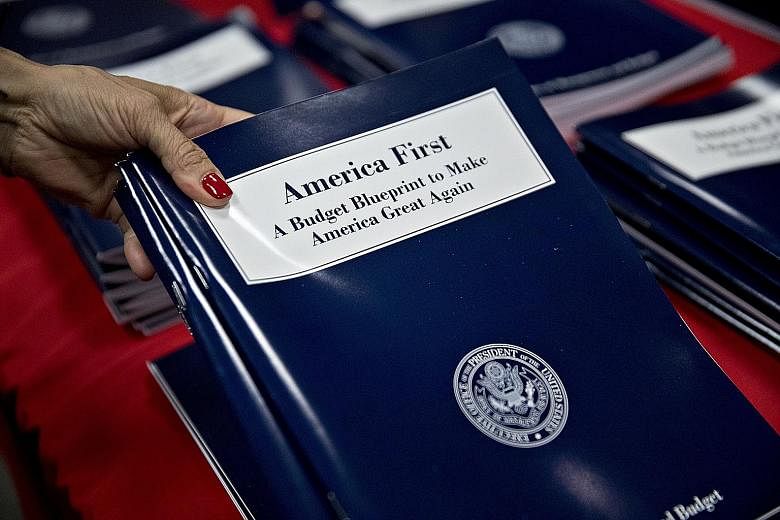WASHINGTON • Some of US President Donald Trump's best friends in Congress have sharply criticised his first Budget, with defence hawks saying the proposed hike in Pentagon spending was not big enough, while rural conservatives and others attacked plans to cut a wide range of federal agencies and programmes.
The bad mood among Republican critics was tempered by a consensus that the President's Budget was not going very far on Capitol Hill, where lawmakers reminded everybody that they ultimately control the nation's purse strings.
"While we have a responsibility to reduce our federal deficit, I am disappointed that many of the reductions and eliminations proposed in the President's skinny Budget are draconian, careless and counterproductive," Representative Hal Rogers, a Republican and former chairman of the House Appropriations Committee, said in a statement. "We will certainly review this Budget proposal, but Congress ultimately has the power of the purse."
Most Republicans gave passing support to Mr Trump's general goal of increasing defence spending while cutting costs elsewhere in the Budget. But none would embrace the specific White House blueprint.
"I've never seen a President's Budget proposal not revised substantially," said Republican Senator Charles Grassley. "As a member of the Budget Committee, I'll carefully scrutinise and assess priorities as the President has with his proposal."
The upcoming Budget clash between Congress and the President has emerged as another obstacle in Mr Trump's young presidency.
-
Winners and losers in proposed plan
-
President Donald Trump's 2018 Budget outline includes an almost 10 per cent hike in defence spending. Overall Pentagon funding would swell for this fiscal year and be paid for by deep cuts to other agencies and the scrapping of a plethora of programmes. Here are some of the winners and losers from the proposed Budget.

DEFENCE
The Budget calls for an increase of US$52 billion (S$73 billion) for the Defence Department above the 2017 base budget of about US$522 billion, enacted under the Obama administration. The plan earmarks the new funds to accelerate the fight against Islamic State in Iraq and Syria militants, reverse army troop reductions, build more ships for the navy and ramp up the air force, including by purchasing additional F-35 fighter jets.HOMELAND SECURITY
The Department of Homeland Security would get a 6.8 per cent increase, with more money for extra staff needed to catch, detain and deport illegal immigrants.Mr Trump wants US$1.5 billion for his promised border wall with Mexico in the current fiscal year, and a further US$2.6 billion in fiscal 2018.
STATE DEPARTMENT, FOREIGN AID
The combined budget for the State Department and US Agency for International Development, or USAID, would fall by 28 per cent, with funding cuts for the United Nations, climate change and cultural exchange programmes. The plan preserves US$3.1 billion in security aid to Israel.
ENVIRONMENTAL PROTECTION
The Environmental Protection Agency's (EPA) budget would be cut by 31 per cent, eliminating its climate change programmes and trimming back core initiatives aimed at protecting air and water quality.The proposal would eliminate 3,200 EPA employees, or 19 per cent of the current workforce. The move would effectively cut funding for the agency's signature Clean Power Plan aimed at reducing carbon dioxide emissions.
HEALTHCARE
Healthcare companies such as drug makers and device makers will pay more than twice as much next year to have their medical products reviewed for approval by the Food and Drug Administration under the proposed budget.
TRANSPORTATION
Oversight of air traffic control would move from the federal government to an independent group under the proposals, which include a 13 per cent cut for the Department of Transportation's discretionary budget.The plan also calls for cutting US space agency Nasa's budget by 0.8 per cent to US$19.1 billion.
REUTERS, AGENCE FRANCE-PRESSE
Just this week, a federal judge in Hawaii issued a sweeping freeze of Mr Trump's latest travel order. The House Republican plan to revise the Affordable Care Act is embattled, as is Mr Trump's push to build a wall on the US-Mexico border. And his tax reform and infrastructure plans have yet to get off the ground.
As he passes the halfway mark of his first 100 days, Mr Trump is under increasing pressure to show that he can make good on his ambitious promises.
Some of his closest allies said his Budget has virtually no chance in Congress, pointing to what they expect to be vociferous opposition from Democrats.
It is not uncommon for Congress to disagree with some priorities in a White House Budget. But the blueprint risks putting Republican lawmakers on a collision course with Mr Trump over demands for spending cuts that they cannot deliver.
Even those fiscal conservatives who do want to reduce spending do not necessarily think that slashing major domestic programmes is the answer. In the past, the White House has worked directly with congressional leaders to agree on an overall spending number for the whole government, which is then passed to Appropriations Committee members to divvy up among different departments and agencies.
One reason for the tepid response on the Hill is that lawmakers are mired in high-level negotiations to craft an interim Budget before the current one expires on April 28. Talks so far have centred on sticking to the two-year bipartisan spending agreement, with an overall spending level of US$1.07 trillion (S$1.5 trillion) for this year.
Republicans expect the spending targets for next year to stay about the same, according to several aides familiar with the negotiations.
But Mr Trump has proposed spending more next year - upwards of US$1.15 trillion - by tapping a separate war fund account as well as other funds.
Many lawmakers also want to increase spending, but doing so would require a bipartisan agreement. Republicans have a slim 52-to-48 majority in the Senate, and any spending deal will require support from Democrats, who will not back increased defence spending without corresponding hikes in domestic spending.
WASHINGTON POST

